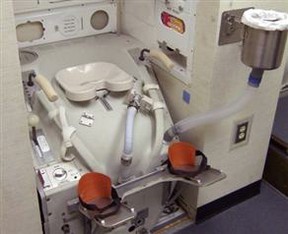 The first issue for any astronaut answering a call of nature is their own weightlessness. They can't just sit down on the toilet and emit a sigh of relief. They'd float off again.
The first issue for any astronaut answering a call of nature is their own weightlessness. They can't just sit down on the toilet and emit a sigh of relief. They'd float off again.
It all requires training back on Earth, plenty of practice, then a bit of preparation while on board the ISS. More than anything, it demands a perfect aim.
Our desperate astronaut slips his or her feet into the foot slots. It provides the anchorage to brace themselves in place. Two foam covered handles can be maneuvered across their thighs to help pin themselves onto the toilet bowl. Some astronauts simply reach up and hold onto the ceiling as well.
A clear plastic bag is inserted into the silvery receptacle to their side. It's ready to receive any tissues. Such things cannot be dropped into the bowl beneath them.
Then it's decision time. Number one or number two? They can't happen together, because each is collected and disposed of in different ways. In order to urinate, the male astronauts take a tube attached to the unit. It's placed over their anatomy and they are good to go.
A light flow of air persuades the urine droplets to continue down the tube, instead of floating away. The suction cannot be too great, as that would cause the poor gentleman an injury.
For female astronauts, the method is nearly the same, except they have further choices before they begin. Three different funnels may be attached, each shaped slightly differently in order to gain the closest match. For the ladies, the key here is to position the funnel snug against them. They haven't anything to insert into the tube, unlike the men!
Even more problematic are bowel movements. With the astronaut's rear end pressed as tightly to the toilet seat as possible, they are able to expel their waste. However, they are aiming at a hole just four inches in diameter. This takes a lot of practice to get right!



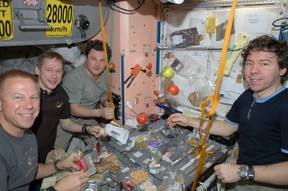 If you can physically touch it, then gravity is working upon it. It's that force, invisible to the naked eye, which holds all matter together. But we can see its effect.
If you can physically touch it, then gravity is working upon it. It's that force, invisible to the naked eye, which holds all matter together. But we can see its effect. 



 The first issue for any astronaut answering a call of nature is their own weightlessness. They can't just sit down on the toilet and emit a sigh of relief. They'd float off again.
The first issue for any astronaut answering a call of nature is their own weightlessness. They can't just sit down on the toilet and emit a sigh of relief. They'd float off again.


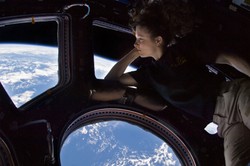

 St Tydecho's Churches in West Waleson 09/03/2014
St Tydecho's Churches in West Waleson 09/03/2014
 Goodies for an Outlander Premiere Partyon 03/06/2015
Goodies for an Outlander Premiere Partyon 03/06/2015
 Holocaust Memorial Day Interview with Rainer Höss, Grandson of Rudolf Architect of Auschwitzon 01/24/2015
Holocaust Memorial Day Interview with Rainer Höss, Grandson of Rudolf Architect of Auschwitzon 01/24/2015
 Romantic Valentine Gifts for an Outlander Fanon 01/16/2015
Romantic Valentine Gifts for an Outlander Fanon 01/16/2015

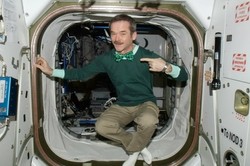
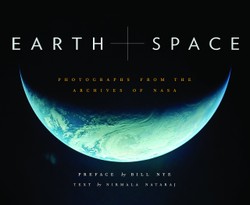
Comments
I'd love to go into space. If only to 'fly' through the ISS.
It used to creep me out, particularly when I thought about Michael Collins - the bloke who kept flying the spaceship around the dark side of the moon, while Armstrong and Aldrin were exploring on the moon. I tried to imagine what it would be like for him, unable to see the Earth, so far away, on his own. *shudder*
But now I know he would have been chatting with Houston all along, and it would probably have been mindbogglingly amazing.
I have to admit that I've always wondered about this. Just one more reason, I'll never go into space. I really found this interesting.
Well you have now! And such things are hard to stop thinking about. :)
Things I haven't thought about!
Ragtimelil - Maybe there's a vocation in there for you. Bathroom finder supreme! Need a bathroom? Any place, anywhere, Ragtimelil Restroom Spotters will find one just for you!
Slogan written. Now we just have to print the posters.
Dustytoes - Ever since I researched and wrote this article, that keeps coming to mind. How often do you go to the toilet for one thing, and it turns into another? They have to ensure that it doesn't!
Sorry, bad mental images...
I always spot the nearest bathroom as soon as I go anywhere. It runs in my family....
I couldn't be an astronaut. I don't think I'd go to the bathroom ever. Then I would explode and be all over the ship. Really, these are special people.
Ragtimelil - I'm taking that as a huge compliment! :D Thanks! I hadn't wondered at all, because it hadn't crossed my mind. But as soon as it did, it took over. I had to find out then!
Spirit of RS - I'm glad to have rekindled some of that childhood wonder! Your model shuttle sounds tremendous.
I haven't seen 'Spacecamp', nor even heard of it before. I've made a note of it now though, so I can check it out. Thanks for the heads up.